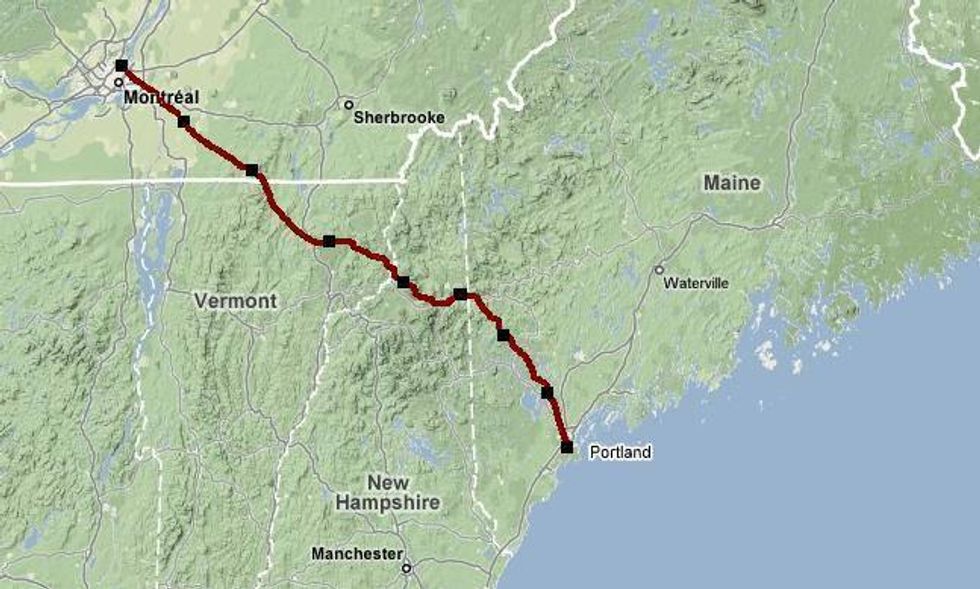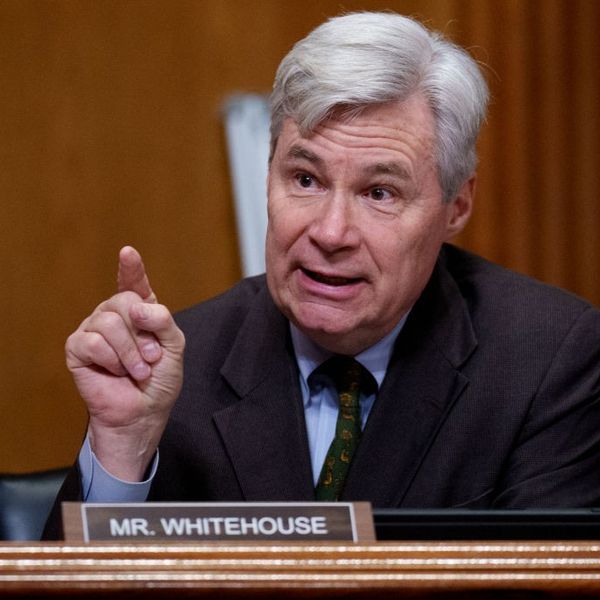Back-Door Tar Sands Scheme Blocked by Maine Community
Thousands petition for referendum to block proposed tar sands export terminal in South Portland harbor
Victory for environmentalists may be near in one of the more overlooked battles in the war against Canadian tar sands oil.
A backdoor plan by Canada's Enbridge and the US-based ExxonMobil to establish an alternate tar sands pipeline has met fierce resistance in the small city of South Portland, Maine where the proposed export terminal would be built.
In a proactive initiative to block the scheme, a local citizens group has collected nearly 4,000 signatures--roughly 4 times the amount necessary--in support of a referendum to place the matter before voters on the November ballot. The question will ask whether the city should enact a zoning change to permanently restrict new development of petroleum-related industry on its waterfront.
"It's clear the people of South Portland want this initiative in November," said Carol Masterson, an organizer with the anti-pipeline group Concerned Citizens of South Portland.
According to the group, "any pumping of tar-sands oil through the city's port would require construction of two smokestacks near [a local park] that would emit an unknown combination of volatile organic compounds and other harmful gases and particles."
South Portland Mayor, Tom Blake, and his wife were the last to add their signatures to the list Monday, the Portland Press Herald reports.
"No amount of jobs are important (enough) if we can't drink the water, breathe the air or work the soil we stand on," he said.
The plan employs an existing 60-year old pipeline that carries oil from freighters docked in South Portland's harbor across northern New England to Montreal. The oil giants hope to connect this line to crude tar sands oil being mined in western Canada and reverse the direction of flow making the coastal Maine town an alternate export terminal for the heavily polluting bitumen.
In addition to concerns about the toxic byproducts of processing or a potentially devastating spill or leak near vital water sources, those against the pipeline fear that by opening up the vast Canadian reserves we will essentially be spelling "game over"--as former NASA scientist James Hansen has said--for the planet.
Below is a map of the Portland-Montreal pipeline route:

_____________________
An Urgent Message From Our Co-Founder
Dear Common Dreams reader, The U.S. is on a fast track to authoritarianism like nothing I've ever seen. Meanwhile, corporate news outlets are utterly capitulating to Trump, twisting their coverage to avoid drawing his ire while lining up to stuff cash in his pockets. That's why I believe that Common Dreams is doing the best and most consequential reporting that we've ever done. Our small but mighty team is a progressive reporting powerhouse, covering the news every day that the corporate media never will. Our mission has always been simple: To inform. To inspire. And to ignite change for the common good. Now here's the key piece that I want all our readers to understand: None of this would be possible without your financial support. That's not just some fundraising cliche. It's the absolute and literal truth. We don't accept corporate advertising and never will. We don't have a paywall because we don't think people should be blocked from critical news based on their ability to pay. Everything we do is funded by the donations of readers like you. Will you donate now to help power the nonprofit, independent reporting of Common Dreams? Thank you for being a vital member of our community. Together, we can keep independent journalism alive when it’s needed most. - Craig Brown, Co-founder |
Victory for environmentalists may be near in one of the more overlooked battles in the war against Canadian tar sands oil.
A backdoor plan by Canada's Enbridge and the US-based ExxonMobil to establish an alternate tar sands pipeline has met fierce resistance in the small city of South Portland, Maine where the proposed export terminal would be built.
In a proactive initiative to block the scheme, a local citizens group has collected nearly 4,000 signatures--roughly 4 times the amount necessary--in support of a referendum to place the matter before voters on the November ballot. The question will ask whether the city should enact a zoning change to permanently restrict new development of petroleum-related industry on its waterfront.
"It's clear the people of South Portland want this initiative in November," said Carol Masterson, an organizer with the anti-pipeline group Concerned Citizens of South Portland.
According to the group, "any pumping of tar-sands oil through the city's port would require construction of two smokestacks near [a local park] that would emit an unknown combination of volatile organic compounds and other harmful gases and particles."
South Portland Mayor, Tom Blake, and his wife were the last to add their signatures to the list Monday, the Portland Press Herald reports.
"No amount of jobs are important (enough) if we can't drink the water, breathe the air or work the soil we stand on," he said.
The plan employs an existing 60-year old pipeline that carries oil from freighters docked in South Portland's harbor across northern New England to Montreal. The oil giants hope to connect this line to crude tar sands oil being mined in western Canada and reverse the direction of flow making the coastal Maine town an alternate export terminal for the heavily polluting bitumen.
In addition to concerns about the toxic byproducts of processing or a potentially devastating spill or leak near vital water sources, those against the pipeline fear that by opening up the vast Canadian reserves we will essentially be spelling "game over"--as former NASA scientist James Hansen has said--for the planet.
Below is a map of the Portland-Montreal pipeline route:

_____________________
Victory for environmentalists may be near in one of the more overlooked battles in the war against Canadian tar sands oil.
A backdoor plan by Canada's Enbridge and the US-based ExxonMobil to establish an alternate tar sands pipeline has met fierce resistance in the small city of South Portland, Maine where the proposed export terminal would be built.
In a proactive initiative to block the scheme, a local citizens group has collected nearly 4,000 signatures--roughly 4 times the amount necessary--in support of a referendum to place the matter before voters on the November ballot. The question will ask whether the city should enact a zoning change to permanently restrict new development of petroleum-related industry on its waterfront.
"It's clear the people of South Portland want this initiative in November," said Carol Masterson, an organizer with the anti-pipeline group Concerned Citizens of South Portland.
According to the group, "any pumping of tar-sands oil through the city's port would require construction of two smokestacks near [a local park] that would emit an unknown combination of volatile organic compounds and other harmful gases and particles."
South Portland Mayor, Tom Blake, and his wife were the last to add their signatures to the list Monday, the Portland Press Herald reports.
"No amount of jobs are important (enough) if we can't drink the water, breathe the air or work the soil we stand on," he said.
The plan employs an existing 60-year old pipeline that carries oil from freighters docked in South Portland's harbor across northern New England to Montreal. The oil giants hope to connect this line to crude tar sands oil being mined in western Canada and reverse the direction of flow making the coastal Maine town an alternate export terminal for the heavily polluting bitumen.
In addition to concerns about the toxic byproducts of processing or a potentially devastating spill or leak near vital water sources, those against the pipeline fear that by opening up the vast Canadian reserves we will essentially be spelling "game over"--as former NASA scientist James Hansen has said--for the planet.
Below is a map of the Portland-Montreal pipeline route:

_____________________

